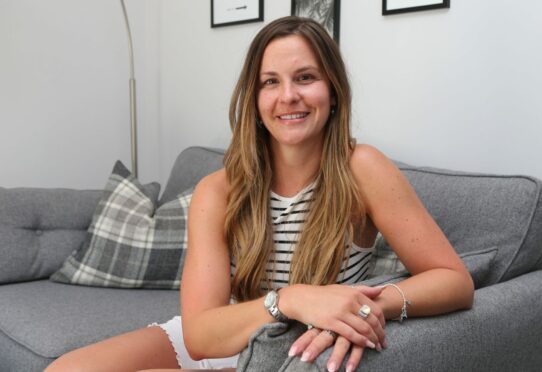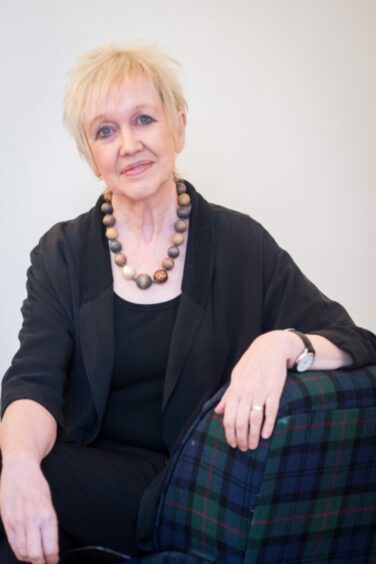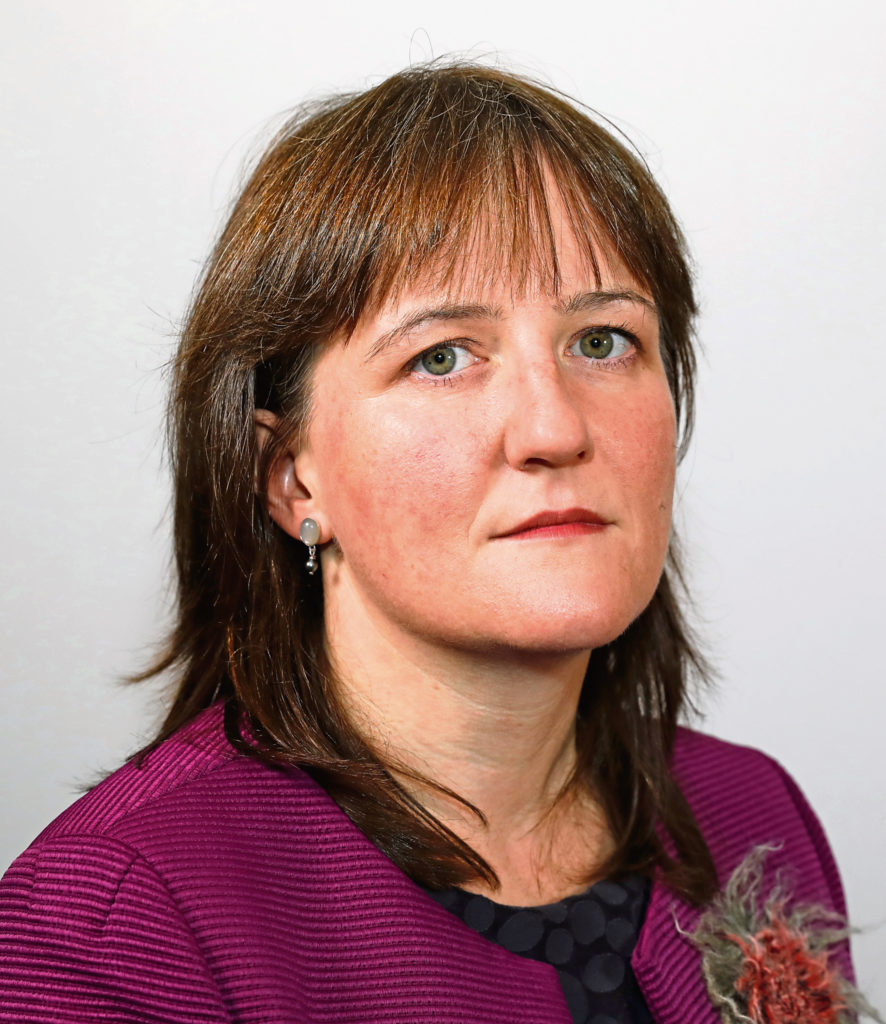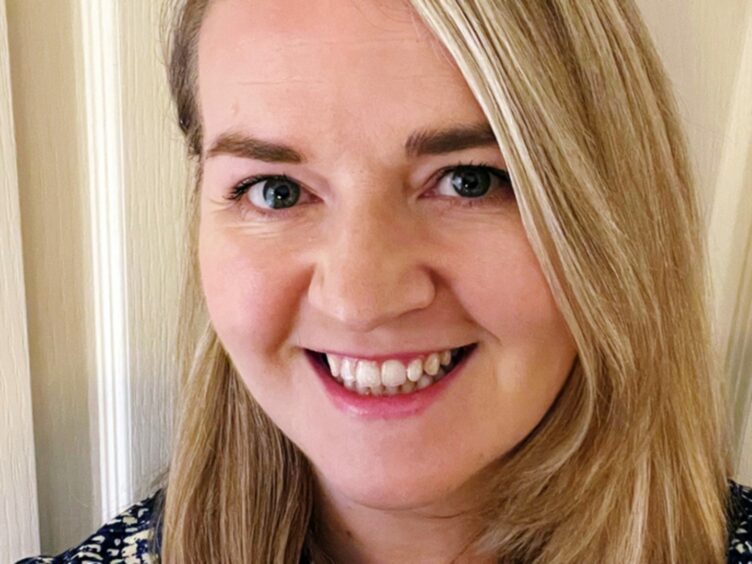
Lockdown has provoked a surge in the number and severity of eating disorders, one of Scotland’s foremost clinicians warns today.
Dr Jane Morris voiced alarm as colleagues suggested the number of patients diagnosed with conditions such as anorexia and bulimia tripled during the pandemic and that, while levels are falling, there are significantly more cases – and more severe cases – than before Covid.
Morris, vice-chair of the Royal College of Psychiatry in Scotland, said she has been left frustrated at the lack of action towards a national treatment network to help sufferers that has been promised since 2021. She said: “It dismays and frustrates me as a clinician but it must be so much worse for parents watching their children suffer and die, asking themselves where is everything we were promised?”
A leading specialist in eating disorders, she points out an increasing number of cases may not necessarily reflect a proportionate increase in these conditions, with some of the rise due to lockdown exposing more problems and a greater awareness.
However, she adds: “Official figures are only collating those who are receiving service or on waiting lists. There is a huge number unreported and a great deal of unmet need.
“Research across the world, on the whole, found Covid was an exacerbating factor, particularly among young women.
“Young men tended to drink more during Covid whereas young women tended to have a worsening of eating disorder symptoms. Those things don’t seem to have entirely settled down.
“Things like anxiety can trigger eating disorders in people who might otherwise have escaped.
“During Covid, we had anxiety about illness itself, anxiety about loved ones, and about missing out on education and work, there were so many different anxieties.
“Now, today, there are fresh anxieties. For some people, the fear of Covid has not gone away, reintegrating back into society is an extra fear, the cost of living, war in the world, all of these things increase anxiety.
“We have emerged from Covid, we have not fully emerged from an age of anxiety.”
Opening up
While lockdown had a devastating impact on many sufferers, some with the most severe eating disorders actually improved during the pandemic, she said, but are at greater risk as society opens up again.
Morris explained: “Those people with a very strong obsessive need to control their lives found living and working from home with limited social contact meant they could impose a routine that made them feel more secure, not less.
“That is the minority but, in some cases, they are the people with the most severe conditions and are most at risk now after the pandemic than during it.”
“In my experience, one very severe patient requires more intensity of effort and care than dozens of less ill patients.
“When patients are still at an early stage you can educate their families to help in the treatment, for example, and they can meet in groups with fellow patients. But when someone is severely ill they might need to be admitted to a general or paediatric ward, they may need admitted to a specialist unit.
“The amount of manpower and resource is enormous.
“Some of my colleagues saw referrals for eating disorders triple during Covid and, while it may be settling, it has not returned to baseline levels. Referrals are significantly higher than before Covid.
“It is not just a matter of numbers, the severity is increasing.
“Admissions to in-patient units increased, there was a doubling of admissions to paediatric wards.
“The people who were physically and mentally at risk surged during lockdown.”
Diagnosing an eating disorder and delivering treatment as early as possible is crucial, according to clinicians, but severe cases are an urgent life-saving priority for attention and resource.
Morris, a hugely experienced consultant psychiatrist who has co-edited two books on eating disorders, said: “The earlier you can offer treatment, while at a relatively early stage, then the faster and long-lasting the treatment will be.
“Once an eating disorder has dug into the person’s lifestyle it become a longer and more complicated business to treat.
“We should certainly not be giving up on treating people who may have been ill for years but it takes a lot more manpower. The more severely ill people we treat, the less resource we have to treat early.
“We are in that vicious circle at the moment. We desperately want to help people in the early stages but it is so important that we help those most severely ill, often young people, and keep them alive. That’s an enormous demand.”
Momentum lost
A Scottish Government review published in 2021 included 15 recommendations to end a postcode lottery of specialist care across Scotland and establish and encourage best practice across the country.
The treatment plan was modelled on an acclaimed perinatal clinical network that rolled out the best services available in some parts of Scotland across the country.
However, momentum, according to clinicians, has been lost as mental health ministers come and go.
Morris said: “Before the pandemic, there was a major push to improve both services and the quality of treatment in Scotland.
“Sadly, that has all stalled. There was supposed to be the network. There was supposed to be an implementation group and there was supposed to be a lived experience panel.
“Individuals have been appointed and the panel has been set up but everything else seems to have been frozen.
“Personnel changes and we are now two mental health ministers later and nothing is moving forward.
“The network could be transformative. We have very good training and excellent clinicians but they need to be integrated into a network.
“We have seen the miracles that have been done in maternal mental health. That would be a very economic and farsighted way of improving treatment for people with eating disorders.
“It’s totally frustrating, wildly frustrating. There was such a lot of goodwill and enthusiasm and I felt that at last we were being listened to. Since then? Nothing.”
She urged Maree Todd, the new mental health minister, to reinvigorate the action plan because what was recognised as a priority before Covid is even more pressing now. There are more cases, she said, more severe cases and a health system struggling with the legacy of the pandemic.
Morris said: “Not only do we have patients with more severe symptoms because they got worse and worse but we also have the damage to the service.
“It is difficult when a service is more or less closed down to start it up again. We’ve got an increasing problem in services that already had a workforce crisis.
“Eating disorders has a very small workforce and there are enormous vacancy rates across the country. Not only have we got all these people queuing up for treatment but a reduced service trying to deliver it. That has to be emphasised.”
She said staffing issues are at critical levels, including the difficulty in recruiting and retaining staff; the mass departure of doctors and nurses burnt-out by the demands of Covid-19; and the impact of their departure on their remaining but demoralised colleagues.
Morris said: “The workforce situation in the NHS, particularly in mental health, is absolutely massive at the moment. As a college, it is probably our biggest concern.
“Most people at 15 will be referred to child and adolescent services and the target is that they are seen within a matter of weeks but people are not meeting those targets and there is no point just insisting that they work harder and harder to meet these targets.
“All that happens is that they cut short treatment for other people. We are at saturation point. We cannot thrash the workforce any harder.”
However, she added, improving pay and conditions and, at last, giving equal attention and resources to mental health as physical health is crucial.
She added: “We must start seeing that investing in the nation’s good mental health and treatment of disorders as an investment in the success of the country.”
She said failing to address the crisis and work to improve and resource the best possible treatment of eating disorders would risk the potential of many young sufferers.
“A lot of the people I see with eating disorders, particularly the young people, have enormous potential. They are very bright and creative. Yet as long as they have to fight this terrible disease, they are paralysed, spending all their energy and opportunities just trying to deal with the disorder, whereas when they recover they have such a lot to give this country. Yes, we need to invest more in a difficult financial climate but it would pay off. We could do so much more so much better. It dismays and frustrates me as a clinician but it must be so much worse for parents watching their children suffer and die, asking themselves where is everything we were promised?”
The Scottish Government said an extra £46 million funding had been promised for mental health services, including the treatment of eating disorders, this year.
Mental wellbeing minister Maree Todd said “good progress” had been made on the short-term recommendations of the national review and work was continuing on the Scotland-wide network.
She said: “We know the pandemic has been an especially challenging time and has had a substantial impact on the mental health of the population, in particular for those impacted by eating disorders.
“We remain committed to ensuring those with concerns about an eating disorder can receive equitable support wherever they are in Scotland.”
During Covid I lost my coping strategies, but I’m in a better place now
When Covid hit and the world locked down, Alanna Goddard, who had been in recovery from anorexia for almost two years, had the resilience to cope. Or so she thought.
She can easily understand why so many Scots developed eating disorders during the pandemic because, despite her progress, the loss of routine shook her.
“For myself, I thought I was fine and in control of things. I had my routine.
“When I got stressed, I would go to the gym and exercise. Then, suddenly, the gyms were closed and I’d lost my routine, my coping strategies.
“It played on me more than I thought it would. I had a fear of what not being able to go to the gym would mean for me.
“I suddenly realised I had to adapt. The alternative was to risk my health deteriorating again and that was a risk I couldn’t take.”
Goddard, now 30, had started counting calories and controlling her diet in her late teens and, by her mid-20s, had developed anorexia. The intervention of friends and family saw her leave the Western Isles, where she had been living, and return to Inverness for treatment.
“That ended in 2018 and I felt in control of things,” she said. “Until the pandemic, at least.”
“I was fortunate in terms of the support network I had and the mindset I had worked to achieve but I had suddenly realised just how vulnerable I still was.
“In a way, I’m glad it happened because it helped me get to where I am today.”
Goddard said the pandemic provided an alarm for some Scots, who may have not known they had an eating disorder until their normal routines were shattered by lockdown.
“It might have encouraged people, who thought they were fine, to realise they actually have a lot of work to do and need to find new ways of coping.”
However, she added, there is no surprise that cases of eating disorders surged in the pandemic.
She said: “I have lived through it. I can understand how it makes people feel and I can understand why cases went up. It didn’t shock me.
“Covid undoubtedly had an impact on people at risk of eating disorders. Some impacts were good, many were devastating.”
Goddard, an ambassador for Beat, a leading eating disorder charity, said: “There is so much more that can be done and raising awareness should be a priority.
“My dad, for example, was my rock but, bless him, he only told me recently that he had been educating himself on what he should be doing, what he should by saying to me.
“You can’t fix people, you can’t take control, you just have to be there because they need to want to get better.
“It takes time to accept you have a problem.
“It took me a long time but I’m in a different, better place now.”
Psychiatrist’s view: Loss of social connections harmed many Scots’ mental health, we need normality
War in Europe and the cost-of-living crisis means the mental health of many Scots has remained in peril since the pandemic, according to a leading consultant.
Kandarp Joshi, a child and adolescent psychiatrist, suspects the impact of anxiety and stress on our immune system during lockdown helped fuel the rise in mental health issues.
However, while cases are falling, clinicians suggest mental health issues remain significantly higher than before the pandemic.
Joshi, who works in the north of Scotland, said: “It is getting better but it is a long journey. We had the pandemic then we had war. There has been a relentless quality that has made us stressed and kept us stressed.
“We need a period of normality to reset. We are resilient people but there are so many adversities.”
He also highlighted the loss of social connection as helping fuel the rise in patients developing serious mental health conditions during lockdown.
“It is hard to generalise but most of us have an innate need for connection as a social being.
“Something happened around the lack of connection and something happened around the immune system.
“There is a curiosity about how mental health and our immune system interacts. It is hard to prove but the psychological and biological are interlinked. If someone is anxious, which is a mental health state, they will respond through their body.”
Joshi said the number and severity of conditions, some like catatonia, which had rarely been reported in the UK, increased significantly during the pandemic.
He said: “Some of the presentations during the pandemic were unexpected. I hadn’t seen this severity of psychosis before.
“We were certainly seeing more presentations. There were more neurodevelopment disorders, things like autism, ADHD (attention deficit hyperactivity disorder), more OCD (obsessive-compulsive disorder), and more overdoses.
“The rise in presentation of eating disorders was most notable. A lot of young people rely on being at school as a way of feeling good about themselves through social interaction and connection.
“Left on their own, they need to find new ways of doing that, often through exercise or dieting.
“That became a trap for some and, before they know it, they are ill.“
Charity: A national network of support is a positive step
A leading eating disorder charity has revealed how staff dealt with four times as many calls for support during lockdown.
Lockdown had a devastating impact on people with eating disorders, according to the charity, Beat, including those developing issues for the first time, others whose condition worsened and sufferers in recovery who relapsed.
Kirsty Pavey, national lead for Scotland, said the charity’s support sessions had surged during lockdown and has remained significantly higher since compared to pre-Covid.
She said isolation and the loss of normal routine and support networks, whether family, school or work, placed additional strain on people suffering or at risk of developing eating disorders.
She said: “The feelings of distress, anxiety and isolation had a massive impact.”
However, she added, there were other less obvious factors increasing the number and severity of cases.
She said: “A fixation on exercise during lockdown was one. That was one of the activities people were allowed to do in lockdown but for those in recovery or living with an eating disorder, over-exercise can be a harmful behaviour.
“People with binge-eating disorders, when they were encouraged to shop less often, were stockpiling food and the temptation was there in the house, so there seems to have been an increase in binge eating.
“Meanwhile, it was more difficult for people caring for someone with an eating disorder. It was overwhelming.”
The charity shares clinicians’ hopes that momentum towards a national network securing best practice across Scotland and ending a postcode lottery of treatment can be regained but believes progress is still being made.
Pavey said several of the shorter-term recommendations included in the Scottish Government’s 2021 review are underway.
For example, Beat have been given funding to ensure all its support services are available across Scotland, the only nation in the UK where that level of service is provided.
The charity has also set up lived-experience panels allowing people in recovery from eating disorders to give input to government policy.
Pavey said: “That feels very positive and the national network is the next step but trying to do things coming out of the pandemic is taking a little longer.
“That’s understandable but I’m cautiously optimistic the network will be up and running by autumn. We have, however, heard a few different timelines.”

Enjoy the convenience of having The Sunday Post delivered as a digital ePaper straight to your smartphone, tablet or computer.
Subscribe for only £5.49 a month and enjoy all the benefits of the printed paper as a digital replica.
Subscribe © Wullie Marr
© Wullie Marr
 © Peter Jolly. Northpix
© Peter Jolly. Northpix © SYSTEM
© SYSTEM